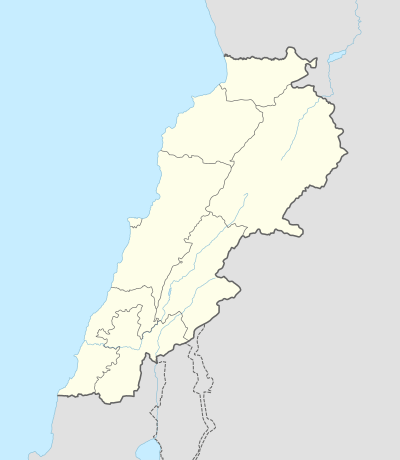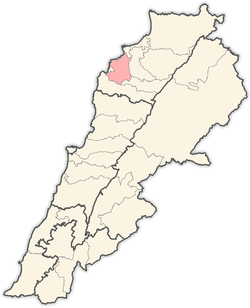Kousba
Kousba (Arabic: كوسبا) is a village in Koura District, in the Northern Governorate of Lebanon. The population are Greek Orthodox, Maronite, and other confessions.[1]
Kousba كوسبا | |
|---|---|
City | |
 Kousba Location within Lebanon | |
| Coordinates: 34°18′6″N 35°51′10″E | |
| Country | |
| Governorate | North Governorate |
| District | Koura District |
| Highest elevation | 500 m (1,600 ft) |
| Lowest elevation | 450 m (1,480 ft) |
| Time zone | UTC+2 (EET) |
| • Summer (DST) | UTC+3 (EEST) |
| Dialing code | +961 |
History
According to the elderly residents of this town, the name Kousba comes from the word "Hidden" because of how it lies between mountains. Kousba is one of the most inhabited villages in the Koura district. It is situated at 18 km south of Tripoli, and 12 km east of Chekka. A main road that runs from Chekka to Bsharri (called "Chekka Arz Highway") passes through Kousba.
Basics
Kousba has a population of about 5,000 residents. It has two public schools with 311 students enrolled in each of them. Statistics from the 2004 municipal elections indicate that Kousba has 7,193 registered voters—of which 4,940 voted. Kousba has 23 companies with more than 5 employees. Kousba has one medical center but no hospitals. This town consists of 601 Hectares of land. Many landmarks exist in Kousba including ancient historical monuments, touristic attractions, religious sites, sports clubs, teaching institutions and social clubs.
Hamatoura Monastery
Late in the 13th century, at Our Lady Monastery in Hamatoura, Saint Jacob began his ascetic life. Later, when the monastery was destroyed by the Mamelukes, he reestablished monasticism along the perimeter of the ruined monastery. In time, he rebuilt the monastery, regenerating and giving renewed vigor to monastic life in the area. His spiritual briskness, vivacity, and popularity among believers drew the attention of the Mamelukes who set their minds to stop his verve and determination and force him to convert to Islam. He stubbornly refused their relentless pressures.
When the Mamelukes' horrible coercive attempts failed, they dragged Saint Jacob, along with a number of monks and laymen, from Saint Georges Monastery, situated atop Mount Hamatoura, to Tripoli City (the capital of Northern Lebanon) and handed him to the wali (ruler). For almost a year, he endured tremendous tortures. Nevertheless, he did not give in or renounce his faith despite receiving both adulations and threats from the Mamelukes.
Although intimidated by Saint Jacob's stubbornness and persistence, finally, as was their custom in punishing their enemies, on October 13, Saint Jacob was beheaded. In addition, the Mamelukes burned his body to ensure the Church will not give him an honorable burial as a martyr, a burial befitting a saint.
Not long after his death, seeing his sufferings and steadfast faith, our Lord bestowed on him everlasting crowns and graces and today he shines as a martyr as much as he was a beacon during his earthly life; at this time the Church announced Saint Jacob's holiness and added him to her list of honored Martyr Saints and prayed for his intercession.
Our Saint was almost forgotten in the course of history. This was due to the severe sufferings of the Church under various Moslem sultanates that both weakened Christian spiritual life and resulted in a noticeable drop of Christian literacy. Additionally, all manuscripts and data that could have been sent and translated abroad were either forgotten, lost, or destroyed. However, recorded encounters by the Monastery's pilgrims, upon seeing visions of Saint Jacob, and many others, who sensed his presence, affirmed and authenticated his sainthood. Glorifying the name of Lord, Saint Jacob also healed many.
We have recently discovered a clear mention of Saint Jacob in a manuscript preserved at the Balamand Monastery in a Gerontikon, a hagiography or compilation of biographical short stories of the lives of holy saints. In a Balamand archival manuscript, numbered 149, it clearly indicates that the Church commemorates his memory on October 13.
The Monastery of the Dormition of the Theotokos - Kousba, Hamatoura, in Lebanon, commemorated his memory, for the first time, on October 13, 2002, in an all-night prayer vigil (agrypnia). A number of priests, deacons, and believers participated in that memorable day, as the attendees chanted Saint Jacob's troparion and Akolouthia, prepared and edited by the monastery's monks.
Today, believers and pilgrims are constantly reporting his apparitions, miraculous healings and other Grace-filled deeds. All of this kindled the spiritual fervorness to celebrate the memory of this Saint and give Praise to the Lord, while honoring Saint Jacob of Hamatoura who is still living among us in his monastery performing miraculous deeds, calls, and visitations to believers.
Businesses in Kousba
Banks, Computer shops, Computer Services (IT), Supermarkets, Jewelries, Car Mechanics, Olive Oils, Perfumeries, Wheels repairs, Lingeries, Clothing, Flowers, Photographing, Silver ware, Ice Creams and Sweets, Car Spare Parts, Buchers, Shoe Shops, Blinds and Curtains Shops, Gas Stations, Eye Glasses, Mobile Phone Shops, Construction Materials, Hair Dressers, Bookshops, Beauty shops and Pharmacies.
References
- "Municipal and ikhtiyariah elections in Northern Lebanon" (PDF). The Monthly. March 2010. p. 23. Archived from the original on 3 June 2016. Retrieved 31 October 2016.CS1 maint: BOT: original-url status unknown (link)
External links
- Kousba, Localiban (in English)
- Kousba, Localiban (in French)
- http://www.kousba.org
- http://www.kousba.gov.lb
- http://www.hamatoura.com/
